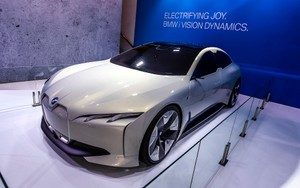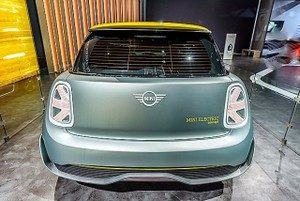German Company Sets Aggressive Goal for Future Cars
We here at Clean Fleet Report absolutely love it when auto manufacturers set their bar high when it comes to new models. We are always rooting for what seems to be the impossible, so we applaude BMW for what should be an exciting time for them, and automotive enthusiasts, as they plan to launch 25 all-new electrified cars by the year 2025.
CFR sat down, at the 2017 Los Angeles Auto Show, with Ralph Mahler, Department Manager of Product Planning & Strategy at BMW of North America. His time was valuable, so we kept the questions short and to the point, specifically asking what was coming next and the expected mix of electricity, diesel and hydrogen. We are intrigued with what we heard.

CFR: BMW has made the bold announcement of 25 new cars by the year 2025. Can you give more details on these cars?
BMW: By 2025, we will have 25 new electrified vehicles. Out of the 25, we will have 12 battery electric and 13 hybrid vehicles. Of these, there will be an all-electric Mini in 2018 and the X3 sport utility in 2020.
CFR: Will any of the new all-electric cars be specifically designed to take on Tesla, head-to-head?
BMW: We are not just taking on Tesla or focusing on just one car, but it is part of a whole strategy. We integrate the battery-electric drivetrain at an early stage into our platforms. This gives us the possibility to react quickly and the possibility to shift, during the next decade, because nobody knows when the complete shift will take place, to put our hybrid and battery-electric drivetrains into all platforms. This is the right thing for us to do.
BMW was the first to come up with purpose-built platforms for the i3 and i8. But we came pretty fast to a conclusion that for scaling, this was not the right way to do it. So, this is a completely different approach than you can see from some of our competitors in the electrification of cars. We are a step further ahead because we did our first round with the purpose-built platforms, but now we know that our new approach is the right way for the future. The nice thing about this as well, is that since we use the same platform, once we have a new battery technology generation, it is much easier to develop it once, and then roll it out over multiple platforms.
CFR: The iPerformance models are selling well. What is the thinking on how these models will transition from combustion engines to electric?
BMW: iPerformance is part of our strategy in this transition phase in the next decade. It is a clear road for these customers going from combustion engines into the next generation of battery electric vehicles. But, in between, most customers will be going into a plug-in hybrid first. Therefore, the iPerformance models are very important for us because we already know that once we have customers in a plug-in hybrid model that 80 to 90-percent of them say their next purchase will be a full battery electric vehicle.
CFR: Let’s briefly talk about the future of diesel in the United States for BMW.

BMW: Diesel is currently important with the demand being in SUVs, but lower in sedans. We believe with plug-in hybrids we have a technology which helps us convince these customers that going into the new electrification era is their next step. We see diesel, especially for passenger cars, decreasing as these customers move into a plug-in hybrid.
CFR: What about hydrogen?
BMW: Hydrogen is very interesting to us. Through what we have done, and what our competitors have done, there is no clear picture as to where this will be in 2030. The key is (how quickly) a high-density battery for performance and range (is developed). Plus, the infrastructure for hydrogen is more costly and at the moment it is at a way lower level than a plug-in car.
CFR: To wrap-up, what is your vision of BMW’s future?
BMW: Like our Chairman of the Board of Management Harald Krueger stated: “The BMW Group has a clear vision of how our customers in the premium segment will stay on the move after 2030. Mobility will be autonomous, electric and fully connected. In all of this, the emotional experience of our customers plays a central role. Individual mobility will be tailor-made to fulfill all of their personal desires and needs.” BMW has a goal, this year, of selling 100,000 electrified vehicles worldwide. The future, by 2035, there will probably only be hybrid combustion engine vehicles; hydrogen fuel cells for big vehicles going long ranges; and for daily commutes you will see battery electric vehicles. Mobility will always be an important issue in the next 100 years, and we believe the future is definitely electrified.
Photo credit: Lex Adams
Related Stories You Might Enjoy:
Road Test: 2017 BMW i3
News: BMW To Announce Electric 3-Series
News: BMW Adds iPerformance Electrics
Road Test: 2016 BMW X5 xDrive40e PHEV
Road Test: 2016 BMW 328d xDrive Sports Wagon
First Drive: 2015 BMW i8

6 thoughts on “Interview: BMW’s Goal: 25 Electrified Cars by 2025”